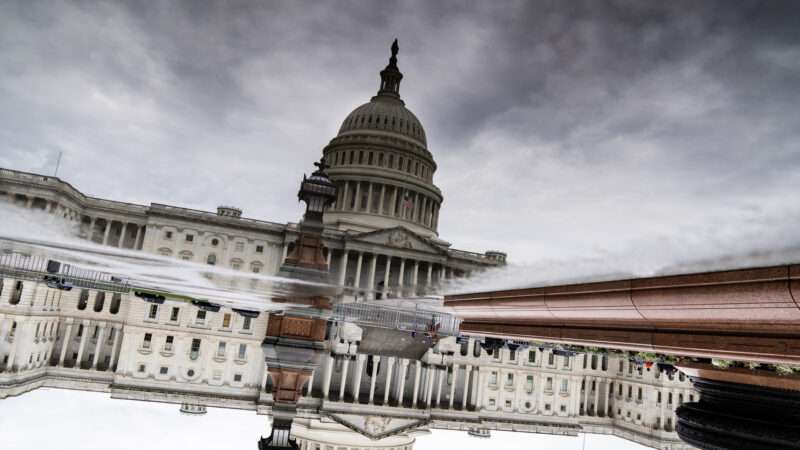
When lawmakers return to Washington next week, they will have just days to avoid a partial government shutdown that could occur on March 1—the first of a series of new fiscal deadlines created during the most recent near-shutdown in November.
It seems highly unlikely that Congress will actually pass a complete budget deal before the March 1 deadline to fund the Departments of Agriculture, Housing and Urban Development, Transportation, Veterans Affairs, and more. It's also unlikely to happen before a slew of other short-term continuing resolutions expire on March 8.
In light of all that, some conservatives are now pushing Speaker of the House Mike Johnson (R–La.) to consider a year-long continuing resolution—as opposed to a possible omnibus bill being rushed to the floor for a vote at the last minute. In a letter to Johnson on Wednesday, the House Freedom Caucus laid out a list of policies its members said should not be included in an omnibus package designed "behind closed doors" and then put up for a vote.
Congress is in session just three days before a partial government shutdown begins March 1.
We need lower spending levels and real policy wins.
If you can't get either, why proceed with higher than Pelosi spending and preserving all Biden's policies?
We need an update. pic.twitter.com/FMFbVJWfP8
— House Freedom Caucus (@freedomcaucus) February 21, 2024
"There are MANY other policies and personnel that Congress should not be funding, and a failure to eliminate them will reduce the probability that the appropriations bills will be supported by even a majority of Republicans," the group wrote in the letter to Johnson, effectively threatening to withhold votes from an omnibus deal that it does not like.
The policies included in the House Freedom Caucus' list of demands are a mix of what you'd expect from that group—some are sincere attempts at trimming government, while others are fodder for fundraising emails and social media clips.
What's more important than any of those specific proposals, however, is what this letter indicates about the ongoing fight within the Republican caucus over how the federal budget ought to be put together.
Members of the Freedom Caucus have spent years (dating back to its time as a more libertarian and less Trumpy body) advocating for a return to the so-called regular order in which Congress passes each of the 12 annual appropriations bills separately. That hasn't happened since 1996. Advocates for a return to the regular budget process argue that an over-reliance on continuing resolutions (which hold spending levels steady for an agreed-to period of time) and omnibus bills (which combine multiple appropriations bills into a single up-or-down vote) have materially weakened Congress' ability to wield its power of the purse and have concentrated power in the hands of congressional leaders at the expense of the rank and file.
So why would the Freedom Caucus now advocate for a continuing resolution? Because its members fear that an omnibus bill rushed through before the March 1 or March 8 deadlines will undo much of the progress that's been made toward the goal of actually negotiating and passing each appropriations bill in turn. The House has passed seven of the 12 since the start of last year (while the Senate has passed just three), so this gambit from the Freedom Caucus is best understood as an attempt to buy more time for this important project to continue.
There is, however, one additional wrinkle. As part of the deal to raise the debt limit last year, hardline conservatives successfully included a provision that would implement an automatic, across-the-board 1 percent spending cut for the entire government on April 30—unless all 12 appropriations bills are passed by that deadline.
That provision was meant to force all sides to the negotiating table so the appropriations bills would get finished within a reasonable amount of time. It might also give Johnson an incentive to ram through an omnibus bill now—thus defusing the April 30 cuts—rather than waiting to see what can get done in the next two months.
That leaves Johnson with a difficult choice. Democrats are unlikely to support a yearlong continuing resolution because of the potential for those automatic cuts to kick in at the end of April*, but a significant chunk of Republicans will oppose an omnibus bill that thwarts the committee-level work that's been done toward the goal of passing all 12 appropriations bills.
How Johnson proceeds from here will determine the future of his term as speaker—or very well may end it. More importantly, next week's action in the House is likely to signal whether a return to "regular order" is actually possible, or whether Congress will default back to the bad budget-making practices that have buried the government in debt.
*CORRECTION: This post has been updated to correct the timing of the automatic cuts.
The post Is Another Government Shutdown Coming? appeared first on Reason.com.







